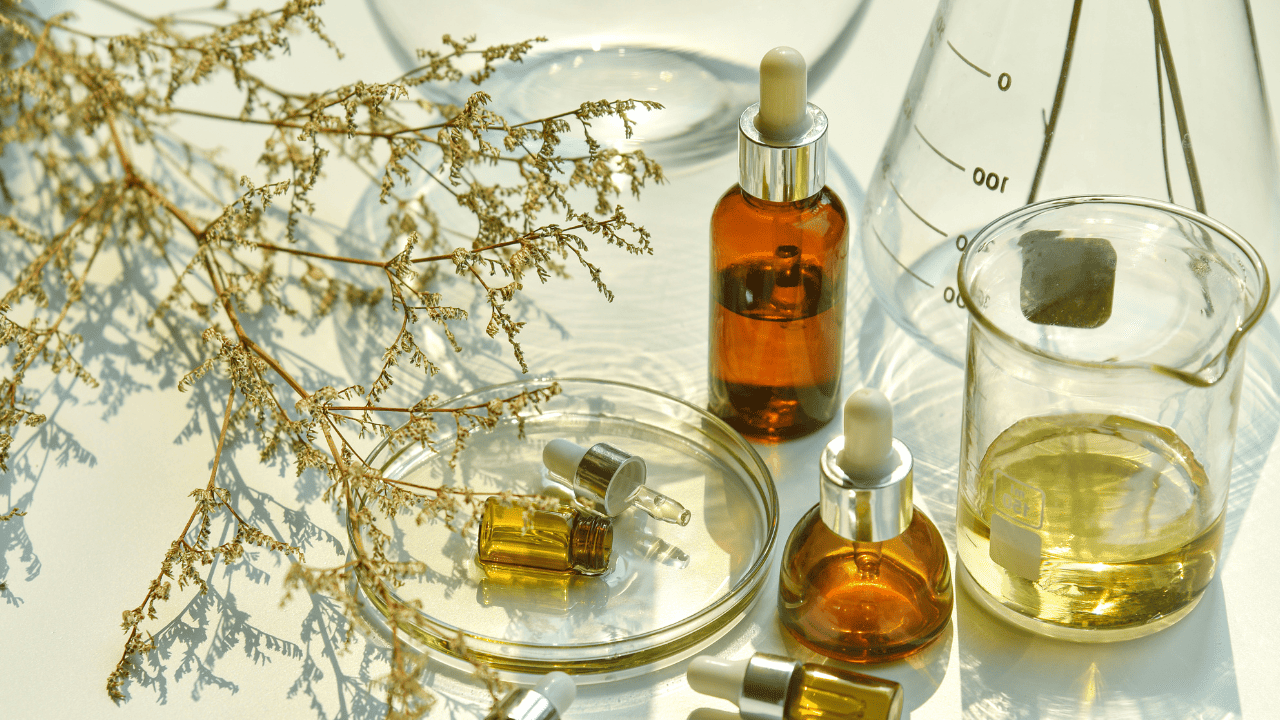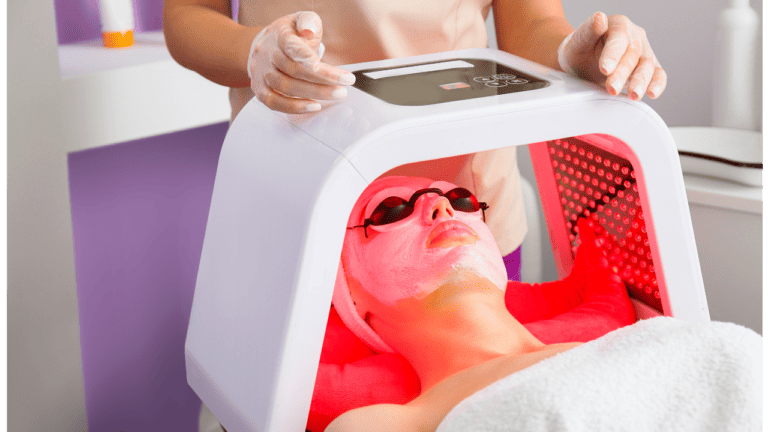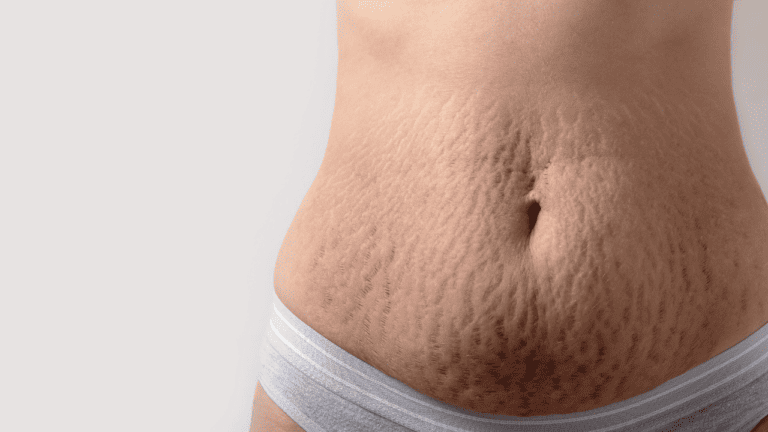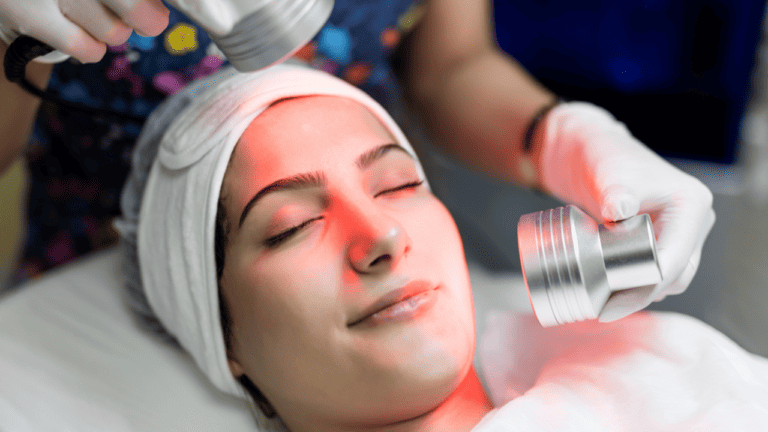Tea tree oil has been shown to be an effective treatment for acne due to its strong antimicrobial properties. In this section, we will discuss how to use tea tree oil for acne, as well as some precautions to ensure safety and effectiveness.
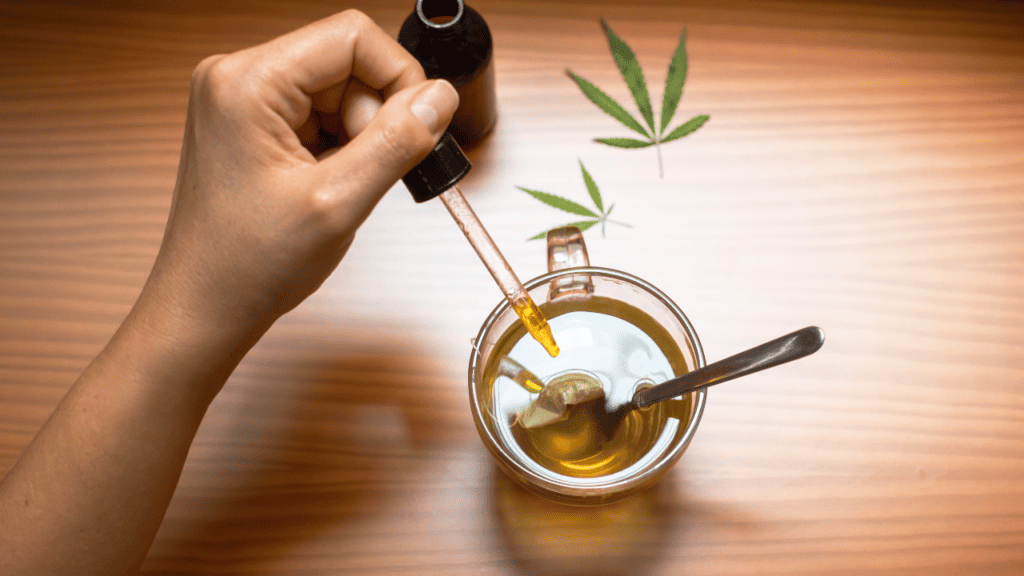
1. Dilute Concentrated Tea Tree Oil
It’s essential to dilute 100% tea tree oil before applying it all over the face as undiluted oil can cause irritation to your skin barrier and even burns. We recommend using a carrier oil to dilute the tea tree oil, such as jojoba oil or olive oil. Generally, a safe dilution for acne-prone skin is 3% tea tree oil, which can be achieved by mixing 3 drops of tea tree oil with 97 drops of a carrier oil.
2. Patch Test For Safety
Before applying tea tree oil to your face, it is crucial to perform a patch test to ensure you won’t experience an allergic reaction or irritation. To perform the patch test, apply a small amount of the diluted tea tree oil to the inside of your elbow or behind your ear, then wait 24 hours. If you observe any redness, itching, or swelling, discontinue use and consult a dermatologist.
3. Spot Treat With Tea Tree Oil
To apply the diluted tea tree oil, first cleanse your skin and pat dry with a clean towel. Then, using a cotton swab or pad, gently dab the oil mixture onto affected areas, letting it absorb into the skin. We recommend applying the oil once or twice daily.
4. Combine with other essential oils
Tea tree oil can be combined with other essential oils to boost its acne-fighting properties. For example, aloe vera has been found to have soothing and anti-inflammatory effects when used in combination with tea tree oil. To do this, simply mix the tea tree oil and carrier oil (as described above) with an equal amount of aloe vera gel. This mixture can be applied to acne-prone skin following the same application method outlined in the Dilution and Application section.
Keep in mind that it’s essential to research any additional essential oils and their compatibility with tea tree oil before using them in combination. Some essential oils may not be suitable for acne-prone skin or could interact negatively with tea tree oil.
By following these guidelines for using tea tree oil for acne, we hope to help you achieve clear, healthy skin. Remember to always dilute the oil, perform a patch test for safety, and consider combining it with other essential oils for enhanced effectiveness.
This post may contain affiliate links, which means I’ll receive a commission if you purchase through my link, at no extra cost to you. Please read full disclosure here.
Tea Tree Essential Oil by Fiora Naturals
100% Pure Organic Oil

Recommended Products With Tea Tree Oil For Acne
Tea tree oil is a popular ingredient in many acne-fighting products, thanks to its natural antibacterial and anti-inflammatory properties. Sometimes it’s easier to just get a ready made product than make your own concoction, so we’ve gathered some noteworthy products containing tea tree oil that can help combat acne.
1. COSRX Low pH Good Morning Gel Cleanser

Face washes containing tea tree oil can help remove dirt and impurities while reducing acne-causing bacteria. For example, the Cosrx Low pH Good Morning Gel Cleanser is a gentle yet effective option for daily use, we found it was suitable for combination to oily skin types.
It helps to pH balance, there’s no sulphates, no parabens, anti breakouts, it’s gentle enough for sensitive skin, it is a good cleanser for acne prone sensitive skin
Pros
- Tea Tree Aroma
- BHA to exfoliate skin
- Gel texture to gently cleanse the skin
Cons
- Drying so not suitable for dry skin types
2. IUNIK Tea Tree 67% Relief Vegan Facial Serum

When our team tried the IUNIK Tea Tree 67% Relief Vegan Facial Serum, we loved that it had a high concentration of Tea Tree Extract. It significantly helped in reducing the redness and swelling associated with my acne.
We found the serum to be particularly soothing and didn’t irritate those of us with sensitive skin. Additionally, its hydrating qualities ensured my skin remained balanced and moisturized, preventing the dryness often caused by acne treatments.
Pros
- Hydrating formulation to combat the drying effect of tea tree oil
- Gentle formulation for sensitive skin
- Vegan formulation: Ensures compatibility with ethical and dietary preferences
Cons
- Tea tree fragrance was a little strong
3. The Body Shop Tea Tree Anti-Imperfection Night Mask

The Body Shop Tea Tree Anti-Imperfection Night Mask focuses on reducing the appearance of pores and controlling excess oil overnight. These are common concerns for those with acne-prone skin. The mask’s lightweight, gel-like texture ensures it doesn’t clog pores while providing hydration. It’s a great addition to a nightly skincare routine for those seeking clearer, more balanced skin.
Pros
- Targets blemishes and imperfections.
- Reduces appearance of pores.
- Controls excess oil production.
- Non-clogging, gel-like texture.
- Hydrates while treating acne.
Cons
- Potential for skin sensitivity
To summarize, incorporating tea tree oil-infused products such as face washes, creams, moisturizers, toners and masks into your acne care routine can be an effective approach to reducing breakouts and promoting clearer skin. Make sure to choose products that suit your skin-type and follow a consistent regimen for the best results.
Side Effects of Using Tea Tree Oil for Acne
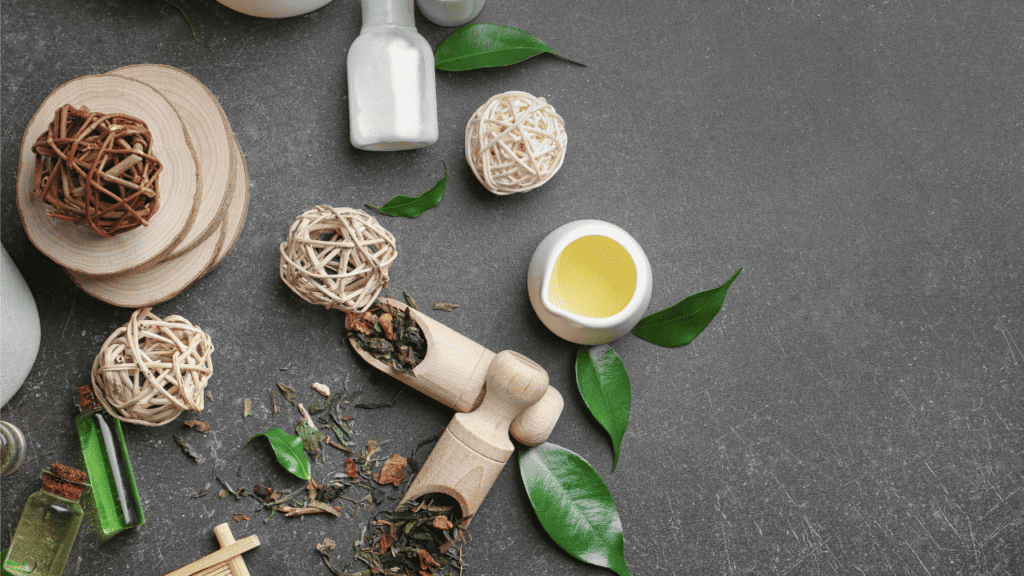
Possible Skin Irritations
When using tea tree oil for acne, we may experience some skin irritations such as itching, redness, and dryness. These side effects are usually mild and can be minimized by diluting the tea tree oil with a carrier oil or using a product containing a lower concentration of tea tree oil. It is also essential to carry out a patch test before applying the oil to the affected area to ensure that our skin is not sensitive to it.
Risk of Allergic Reactions
Tea tree oil has the potential to cause allergic reactions in some individuals, particularly those with sensitive skin or a history of allergies to essential oils. Signs of an allergic reaction may include a rash, skin irritation, or dermatitis. If we experience any of these symptoms after using tea tree oil, it is essential to discontinue using the product and consult a healthcare professional.
Severe Side Effects
Though rare, there are some severe side effects associated with the use of tea tree oil for acne. These may include burning, peeling, and breathing problems. It is crucial to be aware of these potential side effects, monitor our body’s response to tea tree oil, and seek medical attention if any of these symptoms occur.
By understanding the potential side effects of using tea tree oil for acne, we can make informed decisions about whether this natural treatment is the right choice for us. Always remember to use the oil carefully, follow the recommended guidelines, and consult a healthcare professional if any concerns or adverse reactions arise.
Precautions, Warnings and Interactions
We would like to discuss a few precautions, warnings, and interactions that are essential to consider when using tea-tree oil to treat acne. Tea-tree oil is a natural remedy known for its antifungal and antibacterial properties, but it’s crucial to use it safely and responsibly to avoid any potential adverse effects.
Firstly, tea-tree oil can cause skin irritation in some individuals, particularly when used undiluted or in high concentrations. To minimize the risk of skin irritation, we recommend performing a patch test before applying the oil to your face. Apply a small amount of diluted tea-tree oil to a discreet area of your skin and wait for 24 hours to observe any reaction.
Additionally, tea-tree oil can cause confusion, ataxia, and even coma if ingested in large quantities. As a precaution, make sure to avoid ingesting it and keep the oil out of reach of children and pets.
Moreover, while tea-tree oil can be helpful in treating acne, it may not be effective against all strains of bacteria. For example, tea-tree oil has demonstrated effectiveness against methicillin-resistant Staphylococcus aureus (MRSA) in vitro, but we cannot guarantee its effectiveness in all cases.
Furthermore, there are some potential interactions between tea-tree oil and certain medications or other substances. For instance, applying tea-tree oil to the skin or inhaling its vapors may interfere with the effectiveness of some medications, particularly those affecting the central nervous system. Therefore, it is crucial to consult with your healthcare provider if you are taking any medications before using tea-tree oil.
In conclusion, while tea-tree oil can be a helpful alternative treatment for mild to moderate acne, it’s essential to be aware of the potential risks and interactions. Use the oil cautiously, follow instructions, and consult your healthcare professional when necessary to ensure the safe and effective use of this natural remedy.
Professional Opinions and Recommendations
As skincare professionals, we want to provide the most accurate and helpful information on the use of tea tree oil as an acne treatment. According to a systematic review of randomized controlled trials, more evidence is needed to confirm the benefits of tea tree oil for reducing acne lesions; however, its antibacterial properties show promise.
Many dermatologists recommend non-comedogenic products for acne-prone skin, which means that they won’t clog pores. Tea tree oil has been found to have some anti-inflammatory properties, which may help reduce the appearance of mild to moderate comedogenic acne when used as a part of a comprehensive skincare regimen.
In a double-blind investigation, a combination treatment containing propolis, tea tree oil, and Aloe vera showed greater effectiveness in reducing acne when compared to erythromycin cream, a common prescription medication for acne treatment. This suggests that tea tree oil could be a valuable addition to acne management plans for some individuals.
The National Center for Complementary and Integrative Health also acknowledges that tea tree oil may have potential benefits for acne treatment. However, they emphasize the importance of consulting with a healthcare professional before incorporating this essential oil into a skincare routine, as it may cause skin irritation for some people.
We advise that if you’re considering using tea tree oil for acne treatment, it’s essential to patch-test the product on a small area of skin before applying it to affected areas. Additionally, consider discussing your skincare concerns with a dermatologist or qualified professional to determine the best course of action for your specific needs. Tea tree oil may be a helpful tool for some individuals, but it should always be used cautiously and in conjunction with expert advice.
Conclusion
Overall, tea tree oil can be an effective treatment for acne. It holds antibacterial properties and has been shown to improve the overall appearance of skin affected by acne. One study even suggested that a cream containing propolis, tea tree oil, and Aloe vera was more effective in reducing acne compared to preparation with erythromycin cream.
However, it is important to note that tea tree oil should be used with caution. According to a research article, using tea tree oil at concentrations of less than 5% can be safer and more suitable for treating acne. This means that it should be diluted before applying it to the skin to avoid skin irritation.
When it comes to acne scars and scars in general, there is limited evidence of the effectiveness of tea tree oil. However, incorporating tea tree oil into your skincare routine might be beneficial, since it has been shown to be effective in treating acne, which can help prevent the formation of new scars.
Moisturizing is an essential part of any skincare routine, especially for those dealing with acne. While tea tree oil is not a moisturizer, it can be combined with other skincare products that are specifically designed to hydrate the skin and maintain its moisture balance. This can be particularly beneficial in combating the dryness that some acne treatments may cause.
In conclusion, we have seen that tea tree oil can be an effective and natural way to help reduce acne. However, it should be used with caution and in the correct concentrations to avoid potential skin irritation. Combining tea tree oil with other skin care products, like moisturizers and treatments aimed at reducing acne scars, can lead to an overall improvement in the appearance and health of the skin.
